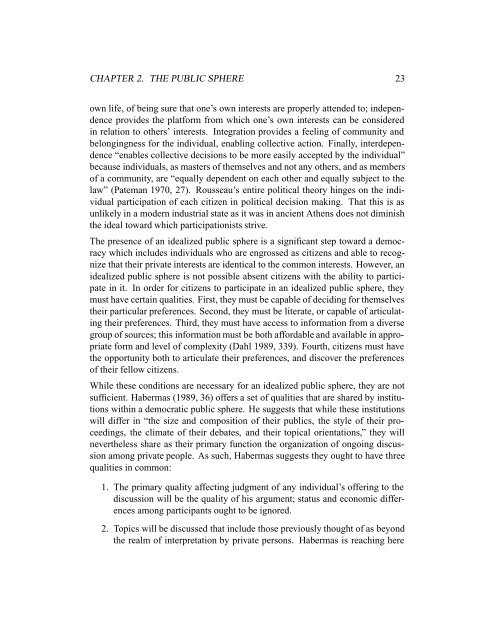Expanding the Public Sphere through Computer ... - ResearchGate
Expanding the Public Sphere through Computer ... - ResearchGate
Expanding the Public Sphere through Computer ... - ResearchGate
You also want an ePaper? Increase the reach of your titles
YUMPU automatically turns print PDFs into web optimized ePapers that Google loves.
CHAPTER 2. THE PUBLIC SPHERE 23<br />
own life, of being sure that one’s own interests are properly attended to; independence<br />
provides <strong>the</strong> platform from which one’s own interests can be considered<br />
in relation to o<strong>the</strong>rs’ interests. Integration provides a feeling of community and<br />
belongingness for <strong>the</strong> individual, enabling collective action. Finally, interdependence<br />
“enables collective decisions to be more easily accepted by <strong>the</strong> individual”<br />
because individuals, as masters of <strong>the</strong>mselves and not any o<strong>the</strong>rs, and as members<br />
of a community, are “equally dependent on each o<strong>the</strong>r and equally subject to <strong>the</strong><br />
law” (Pateman 1970, 27). Rousseau’s entire political <strong>the</strong>ory hinges on <strong>the</strong> individual<br />
participation of each citizen in political decision making. That this is as<br />
unlikely in a modern industrial state as it was in ancient A<strong>the</strong>ns does not diminish<br />
<strong>the</strong> ideal toward which participationists strive.<br />
The presence of an idealized public sphere is a significant step toward a democracy<br />
which includes individuals who are engrossed as citizens and able to recognize<br />
that <strong>the</strong>ir private interests are identical to <strong>the</strong> common interests. However, an<br />
idealized public sphere is not possible absent citizens with <strong>the</strong> ability to participate<br />
in it. In order for citizens to participate in an idealized public sphere, <strong>the</strong>y<br />
must have certain qualities. First, <strong>the</strong>y must be capable of deciding for <strong>the</strong>mselves<br />
<strong>the</strong>ir particular preferences. Second, <strong>the</strong>y must be literate, or capable of articulating<br />
<strong>the</strong>ir preferences. Third, <strong>the</strong>y must have access to information from a diverse<br />
group of sources; this information must be both affordable and available in appropriate<br />
form and level of complexity (Dahl 1989, 339). Fourth, citizens must have<br />
<strong>the</strong> opportunity both to articulate <strong>the</strong>ir preferences, and discover <strong>the</strong> preferences<br />
of <strong>the</strong>ir fellow citizens.<br />
While <strong>the</strong>se conditions are necessary for an idealized public sphere, <strong>the</strong>y are not<br />
sufficient. Habermas (1989, 36) offers a set of qualities that are shared by institutions<br />
within a democratic public sphere. He suggests that while <strong>the</strong>se institutions<br />
will differ in “<strong>the</strong> size and composition of <strong>the</strong>ir publics, <strong>the</strong> style of <strong>the</strong>ir proceedings,<br />
<strong>the</strong> climate of <strong>the</strong>ir debates, and <strong>the</strong>ir topical orientations,” <strong>the</strong>y will<br />
never<strong>the</strong>less share as <strong>the</strong>ir primary function <strong>the</strong> organization of ongoing discussion<br />
among private people. As such, Habermas suggests <strong>the</strong>y ought to have three<br />
qualities in common:<br />
1. The primary quality affecting judgment of any individual’s offering to <strong>the</strong><br />
discussion will be <strong>the</strong> quality of his argument; status and economic differences<br />
among participants ought to be ignored.<br />
2. Topics will be discussed that include those previously thought of as beyond<br />
<strong>the</strong> realm of interpretation by private persons. Habermas is reaching here
















